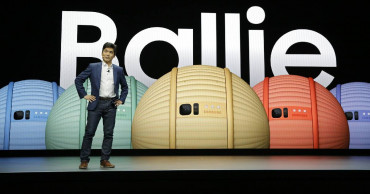CES
At CES, cars evolve into AI-powered companions
At CES in Las Vegas, automakers and tech companies showcased a vision of cars as more than machines—vehicles that can act as proactive companions, adapting to drivers and passengers in real time.
One example presented by Nvidia’s Sri Subramanian illustrated a car recognizing a child entering the back seat, knowing it’s her birthday, and playing her favorite song automatically. “Think of the car as having a soul and being an extension of your family,” Subramanian said. His demonstration highlighted the increasing sophistication of AI systems inside cars and the expanding use of personal data to enhance the driving experience.
Read More: Musk’s Grok chatbot faces global backlash over sexualized AI images
Exhibits across the show emphasized cars’ ability to monitor occupants’ emotions, heart rates, and safety—for instance, alerting if a child is accidentally left behind. Bosch unveiled an AI-powered system aimed at making the cabin a “proactive companion,” while Nvidia introduced Alpamayo, designed to help autonomous vehicles make complex driving decisions. CEO Jensen Huang called it a “ChatGPT moment for physical AI.”
However, experts cautioned that this personalization raises concerns about data privacy. Justin Brookman of Consumer Reports noted that, unlike smartphones, cars are only recently becoming major repositories of personal information. Cameras, microphones, and sensors inside vehicles can feel intrusive, especially since cars are often seen as extensions of personal space. “People generally want more privacy but don’t always know how to protect it,” he said.
Read More: Japan turns to new technology as dementia cases surge
Despite privacy concerns, these AI systems offer potential safety benefits. Automotive supplier Gentex demonstrated a mock six-seater van equipped with AI sensors capable of detecting whether drivers or passengers are drowsy, improperly seated, eating, or distracted. Brian Brackenbury of Gentex said the data is processed and stored within the car, then deleted after use. “We’re not going to collect data just because we can,” he added. “Data privacy is really important.”
The CES showcase reflects a broader trend toward smarter, more interactive vehicles that promise convenience and safety, while also prompting new debates about how personal data should be managed in cars.
1 month ago
Automakers revolutionise in-cabin experiences at CES
Automakers are showcasing cutting-edge in-vehicle experiences at CES, the Consumer Technology Association’s annual tech trade show in Las Vegas, reports AP.
Innovations on display include interior lighting designed to reduce motion sickness, holographic dashboards projected onto windshields, and AI-powered voice assistants integrated with infotainment systems for enhanced driving experiences.
Trump's electric vehicle policies create uncertainty for automakers
Hyundai Mobis demonstrated full-windshield holographic technology, BMW unveiled its new “iDrive” panoramic display, and Honda, along with Sony Honda Mobility, previewed features in their forthcoming electric vehicles. These advancements aim to make the car interior a more comfortable and engaging space, according to Axel Maschka, Hyundai Mobis’ executive vice president and head of business.
Hyundai Mobis’ holographic windshield display, which remains years away from commercial availability, projects critical driving information, safety alerts, and entertainment options across the windshield. This technology provides varied views based on seating position: for instance, the front-row passenger can watch a movie or play a game, while the driver’s view remains distraction-free. Maschka highlighted that this setup ensures drivers focus on the road by minimising unnecessary distractions.
Automakers Renault, Nissan make cross-shareholdings equal
Car safety experts stress the importance of keeping drivers’ eyes on the road and avoiding overly complex displays. Ian Reagan, senior research scientist at the Insurance Institute for Highway Safety, warned that too many visual elements could overwhelm drivers. While he acknowledges recent progress in panoramic displays designed to simplify information presentation, he cautions that not all innovations prioritise safety over consumer appeal.
BMW echoed this focus on streamlined information with its Panoramic iDrive and Operating System X, debuting in select models later this year. Stephan Durach, BMW’s Head of UI/UX Development, emphasised the importance of presenting only essential details in the driver’s line of sight, aiming to reduce distractions. He rejected the idea of cars as “smartphones on wheels,” underscoring the need for clarity and minimalism in design.
Sony Honda Mobility introduced “Afeela 1,” featuring an AI-driven voice assistant that engages in interactive conversations to enhance the driving experience. CEO Yasuhide Mizuno described the assistant as proactive, providing drivers with useful information while entertaining them. Scheduled for release later this year, with deliveries starting in mid-2026, Afeela 1 also offers a panoramic infotainment system with various entertainment apps.
Automakers face a threat to EV sales: Slow charging times
Meanwhile, Honda previewed its upcoming 0 series of electric vehicles, set to launch in North America next year. Its “AISMO OS” operating system supports automated driving, advanced driver assistance, and customisable in-car infotainment. Honda promises continuous updates to its software, allowing vehicles to become more personalised over time. Katsushi Inoue, Honda’s global head of electrification, explained that increased usage would enhance the system’s adaptability to individual preferences.
Despite the enthusiasm surrounding these advancements, safety and usability concerns persist. Reagan noted that partially automated driving systems often lead to higher driver distraction, as users must remain ready to intervene. Similarly, AI voice assistants, while potentially reducing visual distractions, can become counterproductive if they require overly complicated interactions.
In addition to enhancing in-cabin experiences, automakers at CES highlighted the importance of sustainable energy. Honda, in collaboration with seven other automakers, is working on the “IONNA” charging network, aiming to provide over 100,000 charging stations in North America by 2030. The company is also exploring AI-driven solutions to personalise charging, such as locating nearby stations or simplifying payment processes, with potential integration of Amazon Web Services technology.
CES 2025 offers a glimpse into the future of driving, where comfort, connectivity, and sustainability converge — though ensuring safety remains a critical challenge as these innovations evolve.
1 year ago
‘Worst in Show’ CES products put users' data at risk, cause waste: Privacy advocates
So much of the technology showcased at CES includes gadgets made to improve consumers' lives — whether by leveraging AI to make devices that help people become more efficient, by creating companions to cure loneliness or by providing tools that help people with mental and physical health.
But not all innovation is good, according to a panel of self-described dystopia experts that has judged some products as “Worst in Show." The award that no company wants to win calls out the “least repairable, least private, and least sustainable products on display."
“We’re seeing more and more of these things that have basically surveillance technology built into them, and it enables some cool things,” Liz Chamberlain, director of sustainability at the e-commerce site iFixit told The Associated Press. “But it also means that now we’ve got microphones and cameras in our washing machines, refrigerators and that really is an industry-wide problem.”
The fourth annual contest announced its decisions Thursday.
A new smart ring every few years?
Kyle Wiens, CEO of iFixit, awarded the Ultrahuman Rare Luxury Smart Ring the title of “least repairable.”
The rings, which come in colors like dune and desert sand, cost $2,200. Wiens said the jewelry “looks sleek but hides a major flaw: its battery only lasts 500 charges.” Worse, he said, is the fact that replacing the battery is impossible without destroying the device entirely.
“Luxury items may be fleeting, but two years of use for $2,200 is a new low,” he said.
Ultrahuman did not immediately respond to a request for comment.
An AI-powered smart crib?
Bosch’s “Revol” crib uses sensors, cameras and AI that the company says can help monitor vital signs like how an infant is sleeping, their heart and respiratory rates and more. The crib can also rock gently if the baby needs help falling asleep and signal to parents if a blanket or other object is interfering with breathing.
EFF Executive Director Cindy Cohn said the crib preys on parents' fears and “collects excessive data about babies via a camera, microphone, and even a radar sensor.”
“Parents expect safety and comfort — not surveillance and privacy risks — in their children’s cribs,” she said in the report.
Read: Japan links Chinese hacker MirrorFace to dozens of cyberattacks targeting tech data
A spokesperson for Bosch told The Associated Press that all data is encrypted end-to-end and stored on Bosch-administered servers, “while all data at rest is secured locally with individual data encryption keys.”
“Caregivers have the final say on whether data is transmitted at all. The Revol has an offline mode, which keeps data local if preferred,” the spokesperson said, adding that the smart crib helps keep children safe.
Too much waste?
Although AI is everywhere at CES, Stacey Higginbotham, a policy Fellow at Consumer Reports, felt that SoundHound AI’s In-Car Commerce Ecosystem, powered by its Automotive AI, pushes it to unnecessary extremes.
The feature “increases energy consumption, encourages wasteful takeout consumption and distracts drivers—all while adding little value,” Higginbotham said. That landed the in-car system as “least sustainable” on the list.
Soundhound AI's platform allows drivers and passengers to order takeout for pick-up directly from the car’s infotainment system. The company did not respond to a request for comment. In a statement Tuesday, Keyvan Mohajer, CEO of SoundHound AI, said the product's launch marks an moment “decades in the making.”
“What begins here with food and restaurants will ultimately open up a whole new commercial ecosystem for vehicle and device manufacturers everywhere,” he said.
Vulnerable to hacking
TP-Link's Archer BE900 router won for “least secure” of CES. The company is a top-selling router brand in the U.S. But its products are vulnerable to hacking, said Paul Roberts, founder of The Security Ledger.
"By Chinese law, TP-Link must report security flaws to the government before alerting the public, creating a significant national security risk," he said. “Yet TP-Link showcased its Archer BE900 router at CES without addressing these vulnerabilities.”
In an email response, TP-Link Systems contested the report.
“TP-Link Systems Inc. is a U.S.-headquartered company and does not provide any such security reporting to China as referenced by iFixit,” the company said. “TP-Link Systems has a secure, vertically-integrated, and U.S.-owned international supply chain. Nearly all products sold in the United States are manufactured in Vietnam.”
TP-Link said it controls its own supply chains, and “is constantly assessing potential risks to its U.S. operations, customers, and supply chain," adding that it acknowledges that vulnerabilities exist across the industry.
Read more: Musk hiring cheaper tech servants from Asia: Alleges Bernie Sanders
“However, contrary to claims of widespread vulnerabilities, comparative data places TP-Link on par with, or in some cases ahead of, other major industry players in terms of security outcomes,” the company said.
Who asked for this?
The awards also feature a category called “who asked for this?” Top of that list was Samsung's Bespoke AI Washing Machine, which Nathan Proctor, senior director of U.S. PIRG, a consumer advocacy group, said is filled “with features no one needs,” including the ability to make phone calls.
“These add-ons only make the appliance more expensive, fragile, and harder to repair,” he said.
Samsung did not respond to a request for comment.
At a press conference at CES Tuesday, Jong-Hee Han, vice chairman of Samsung’s device experience division, said that he was “proud of how we have introduced new technologies and intelligence to the home, connected key devices and set the standard for the home of the future.”
“We are reinforcing our commitment to delivering personalized experiences through our widespread implementation of AI and we will continue this journey of AI leadership in the home and beyond, not just for the next decade, but for the next century,” he said.
The worst overall
Gay Gordon-Byrne, executive director of The Repair Association called the LG “AI Home Inside 2.0 Refrigerator with ThinkQ” the worst product overall. The fridge adds “flashy features,” Gordon-Byrne said, including a screen and internet connection.
“But these come at a cost,” Gordon-Byrne said. “Shorter software support, higher energy consumption, and expensive repairs reduce the fridge’s practical lifespan, leaving consumers with an expensive, wasteful gadget.”
Christopher De Maria, director of public relations at LG Electronics, disagreed with Gordan-Byrne's assessment of their new product.
“Of course, like any new innovation, there will be naysayers, but we believe that when we launch this product, consumers who are looking to elevate their kitchen experience will appreciate its innovative features, convenience and performance. We have not announced pricing or availability or shared any information regarding energy consumption, so these comments are respectfully without factual merit.”
1 year ago
Best of Consumer Electronics Show 2024: The Top Picks
Like every year, the Consumer Electronics Show 2024 marked the start of an exciting year of tech ahead. From wearables to entertainment to even farming tech, CES brings about every form of consumer tech imaginable under one roof. From January 9 to 12, the event took place at the Las Vegas Convention Center located in the Nevada state of the United States. Let’s dig into the best picks from this year’s CES.
The Most Exclusive Tech Gadgets of CES 2024
Rabbit R1: A Standalone Personal Assistant
The concept of Rabbit R1 might be a bit complex for some. It’s essentially a $199 device meant to use your phone for you. And if you’re not scratching your head already, it essentially uses AI to navigate tasks on your phone which otherwise you’d have to do yourself.
Rabbit R1 uses a simple command button like ChatGPT where you speak a command and it gets on with the task using your smartphone as the base. For example, ordering food or booking a UBER. The possibilities are supposed to be limitless with this AI assistant. While many are still skeptical about its practicality, Rabbit R1 was a highlight at CES.
Signature Series T OLED from LG: A New Transparent OLED Tech
LG unveiled its Signature Series T OLED screen at CES 2024. And in short, this is probably what magic in tech looks like.
The transparent screen is mounted on a frame, which when turned off, looks just like a slab of glass. The screen can project everything a normal OLED panel can do except without a background. The result is an entirely new viewing experience which honestly feels surreal.
Read more: Apple's Vision Pro Headset: Everything You Need to Know
LG even incorporated a raisable black screen at the back for a more traditional viewing experience. The 77-inch screen provides ample real estate to enjoy any kind of content on it, even holographic ones!
2 years ago
Best of CES 2023: Electric skates, pet tech and AI for birds
Tech companies of all sizes are showing off their latest products at CES, formerly known as the Consumer Electronics show.
The show is getting back to normal after going completely virtual in 2021 and seeing a significant drop in 2022 attendance because of the pandemic.
Exhibitors range from big names including Sony and LG to tiny startups. You might see the next big thing or something that will never make it past the prototype stage.
On Tuesday night, the show kicked off with media previews from just some of the 3,000 companies signed up to attend. CES officially opens Thursday.
Read More: CES 2023: Russian exhibitors barred from tech show
Best Products of CES 2023
Here are some highlights:
POKEMON, BUT MAKE IT BIRDS
Bird Buddy showed off a smart bird feeder that takes snapshots of feathered friends as they fly in to eat some treats. The startup says its AI technology can recognize more than 1,000 species of birds, allowing users to share through a mobile app what kind of birds they’re feeding.
“We try to kind of gamify the collection so it’s a really fun game that you can play — almost like a real life Pokémon Go with real animals and wildlife in your backyard,” said Kyle Buzzard, the company’s co-founder and chief hardware officer.
The product has already sparked some interest from consumers who want to show the world what birds are coming into their backyards.
The company, which began as a Kickstarter project in 2020, says it started shipping its bird feeders in September and has already sold all 100,000 in its inventory. The price for the basic feeder is $199.
Read more: Top 5 Inventions of Scientist Isaac Newton
ELECTRIC SKATES
Journalists had fun zipping around the exhibit hall on remote-controlled, electric inline skates from French startup AtmosGear.
The battery lasts for 20 miles (32 kilometers), said founder Mohamed Soliman, who hopes people will see them as a viable way to commute, like electric bikes or scooters.
“My goal is for everyone to go skating again because it’s so much fun, every time you see people skating you see them with a big smile,” Soliman said.
A waist bag holds the battery and cables connected to the skates. They also can be used as regular skates when they need to be charged or skaters simply want to travel under their own power.
The $500 skates are available for pre-order. The company has taken orders for 150 pairs so far and is aiming for 200 orders to start production.
Read More: Top 10 Most Exciting Innovations of 2022 in Technology
DIGITAL TEMPORARY TATTOOS
A handheld device displayed by South Korean company Prinker allows you to quickly and easily apply temporary tattoos.
The device uses cosmetic-grade ink with a library of thousands of designs or the option to make your own with the company’s app. After picking a tattoo, you just wave the device over wherever you want it applied. The tattoos are waterproof but wash off with soap.
The flagship model is $279 and a smaller model is $229. Ink cartridges good for 1,000 tattoos are $119.
Read More: Best of CES 2023: Wireless TV, delivery robots and in-car VR
HELPING FIND YOUR WAY
Japan-based Loovic has created a device designed to solve the challenges of those who have difficulty navigating while they walk.
The device worn around the neck employs sounds and vibrations to guide users to destinations, enabling them to look at what’s around rather than focusing on a phone’s map app.
Loovic co-founder and CEO Toru Yamanaka said he was inspired to create the device for his son, who has a cognitive impairment making it difficult for him to navigate.
The prototype device is not yet available to the public.
Read more: Alzheimer’s drug approval ‘rife with irregularities’: Probe
A FITNESS TRACKER FOR YOUR DOG
If you wonder what your dog is doing while you’re not home, French startup Invoxia has a product for you. The company’s smart dog collar monitors your pet’s activity and sleep, sending the data to your phone.
The latest version unveiled at CES, which has a GPS tracker, includes more advanced heart health monitoring.
The collar is $149 in the U.S. while a monthly $8.25 subscription to the app monitors the data and shares it with your veterinarian.
METAVERSE FOR KIDS
The creators of Roybi, an educational AI robot that helps children learn about STEM topics and new languages, are venturing into the metaverse.
Read More: Top 11 Major Medical Science Innovations in 2022
The RoybiVerse is expected to offer stations where K-12 and higher education students can learn about a wide range of educational topics.
Users walking around the RoybiVerse will be able to visit an area where they’ll learn about dinosaurs or walk over to the virtual library where they can pick a book and read it.
The RoybiVerse, which is expected to launch by mid-2023, will be available in virtual reality headsets and on a website. No robot needed.
3 years ago
Invitation to Ivanka Trump draws backlash at big tech show
The nation's largest consumer electronics show on Tuesday hosted Ivanka Trump as a keynote speaker — a choice that drew scorn from many women in technology.
6 years ago
CES tech show: Say no to junk food; machines make cocktails
A wristband that will help you say "no" to junk food. A machine that will mix drinks for you.
6 years ago













